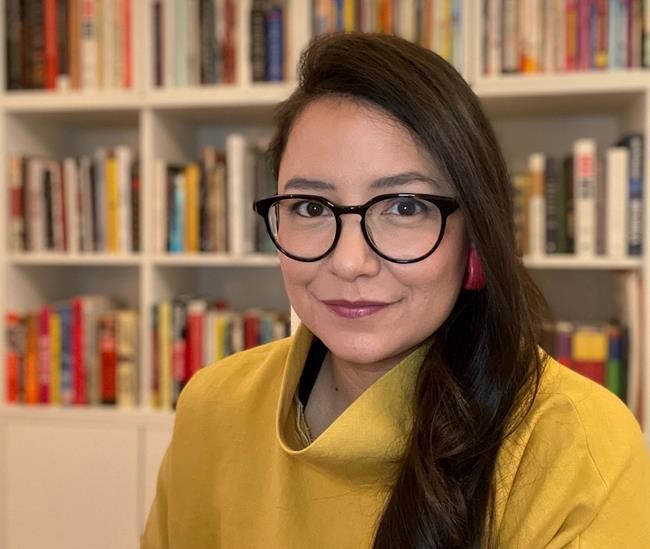
Connie Walker, a Cree journalist from Okanese First Nation in Saskatchewan, is seen in an undated handout photo. Walker will launch a new season of her podcast, "Stolen: Surviving St. Michael's", on May 17. The Spotify-Gimlet's series traces her late father's painful experience at one of Canada's residential schools, and how it would come to impact his life and his relationship with her. THE CANADIAN PRESS/HO-Connie Walker, *MANDATORY CREDIT*
May 13, 2022 - 7:16 AM
TORONTO - For investigative journalist Connie Walker, going deep and getting personal is nothing new.
But with her latest project, for the first time in her 20-year career, Walker faced the difficult task of unearthing secrets and reopening long-buried wounds within her own family.
"It's nerve-racking; these are real people and their real experiences, and I always feel such a weight and a responsibility to not contribute to any harm and to be respectful of what they have gone through," says Walker, a former CBC reporter who previously helmed the podcasts “Missing & Murdered: Finding Cleo” and “Stolen: The Search for Jermain."
"Those responsibilities feel even heavier when it's your father, your aunts, uncles, brothers and sisters," she adds.
For the second season of the Spotify-Gimlet podcast "Stolen," Walker, who is Cree from Okanese First Nation in Saskatchewan, traces the painful past at a Canadian residential school of her late father, Howard Cameron, and how it impacted his life and his relationship with her. Titled "Surviving St. Michael's," the project premieres on May 17.
The idea came to Walker after her brother told her a story she'd never heard before and says she is likely to never forget: one night in the 1970s, while working as a Royal Canadian Mounted Police officer, Cameron pulled over a drunk driver and found himself staring down a priest from his residential school days.
After beating the man to the point that he was left bloodied and crumpled on the ground, Cameron drove away.
Hearing the story "changed everything" for Walker, especially after last year's discovery of hundreds of unmarked graves at a former Kamloops residential school, and propelled her to find out more.
"I think for Indigenous people, especially people like me who have been trying to shine a spotlight on the truth about residential schools, it was a relief that people were finally paying attention and that there seemed to be an acknowledgment of what Indigenous people and survivors have been saying for so long about what they endured," says Walker in an interview from her home in Toronto.
"But on the other hand, the weight felt even heavier," she adds.
Walker recalls feeling "lost" in the weeks after the Kamloops discovery, but feeling inspired when she saw family and friends then sharing their own stories of life in the residential school system on social media.
So when she heard about her father's encounter that night, Walker says, "I had this pit in my stomach, thinking, what happened to him there? What did this priest do to him?
"It was the first time I really had to confront that in a way that I never had before.
"And once it was in front of me, I couldn't just get past it, I had to go through it. I was compelled to go further and stare it in the face."
In her investigation, Walker leaves no stone unturned, hunting down St. Michael's residential school priests, and speaking with survivors, including her aunts and uncles, about what happened all those years ago — all while grappling with the generational trauma still rippling through her family.
"Learning about my dad has had to happen through the people who knew him better than I do, which were his siblings, and they all have their own experiences in residential school," she says, adding those were things "we just didn't talk about" prior to her investigation.
But her family was incredibly "open, generous and supportive," says Walker, though having them be a part of this project has involved great "anxiety, fear, sadness, heartbreak, but also so much gratitude and so much empathy and so much love."
"It has definitely helped me reconnect with that side of my family and that's something that I really cherish," she adds, noting there's a tremendous pressure in getting their story right and sharing it with the world.
All in all, however, it's made for a "healing, therapeutic" journey for the award-winning journalist, who now feels closer to her father than ever before.
Cameron had been a rare presence in Walker's young life, and when he was around, she says, he was often violent, leaving her afraid of him for years, keen to keep her distance.
But after learning of the physical and sexual abuse he experienced, she says "it finally clicked and gave me some insight into why he was the way he was when I was a kid."
After completing the investigation, Walker adds, "Now, it's a huge regret of mine that I didn't take the time to connect with him.
"I really feel like I've gotten to know him in a new way ... and what I've been able to learn about him leaves me in awe that he was able to keep going, learning, healing and prioritizing his family."
The experience has Walker eager to continue exploring her community's stories in podcast form, which she believes make space for a "deeper dive" and "greater immersion" than traditional media.
"It's the perfect way to be sharing our stories, which have been misrepresented and underrepresented for so long," says Walker.
"We are one family of thousands who share this history."
But ultimately, says Walker, "I just want to do my dad proud."
This report by The Canadian Press was first published May 13, 2022.
News from © The Canadian Press, 2022